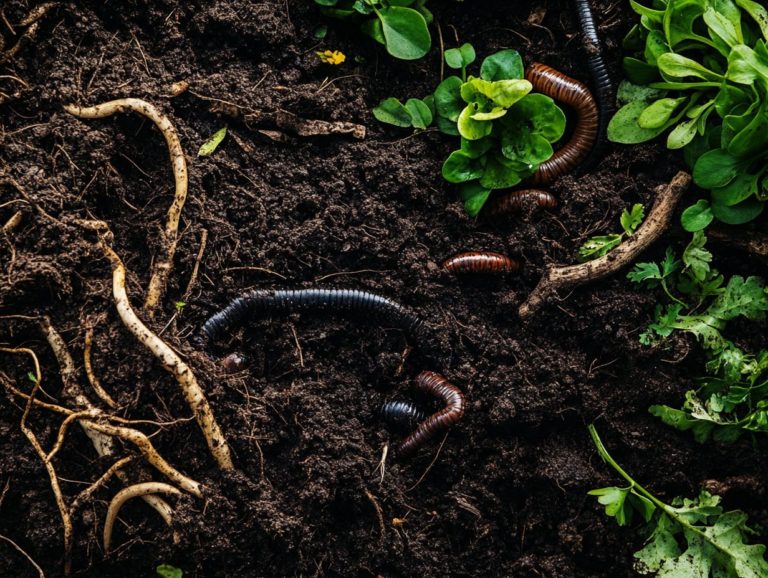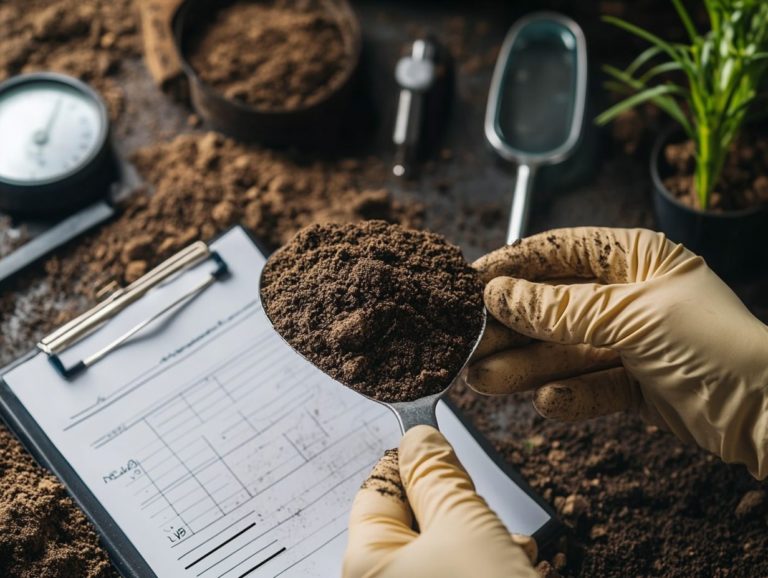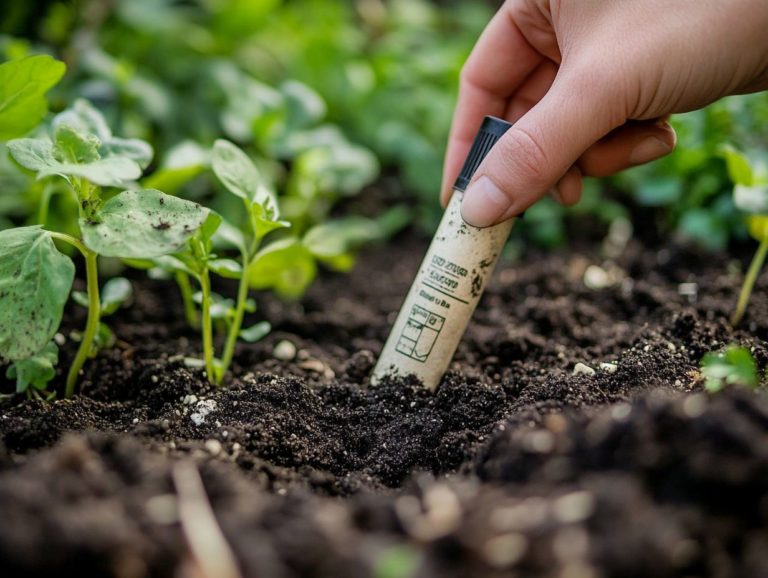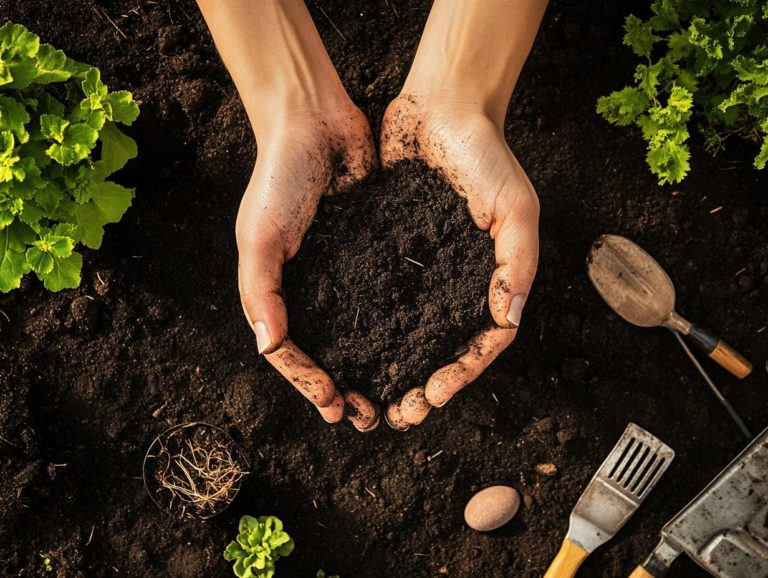5 Essential Organic Fertilizers for Soil
Are you prepared to elevate your garden s vitality while remaining eco-conscious?
This article delves into five essential organic fertilizers compost, manure, bone meal, fish emulsion, and seaweed and kelp that can rejuvenate your soil and enhance plant health while incorporating sustainable practices.
You ll explore the distinctions between organic and chemical fertilizers, uncover the numerous benefits of choosing organic, and discover best practices for effective application.
You ll even learn how to craft your own organic fertilizer right at home and dispel some common myths along the way. Get ready to transform your garden into a natural paradise!
Contents
- Key Takeaways:
- 1. Compost
- 2. Manure
- 3. Bone Meal
- Want Your Plants to Thrive? Discover the Magic of Fish Emulsion!
- Unlock the Benefits of Seaweed and Kelp!
- What Are Organic Fertilizers and How Do They Differ from Chemical Fertilizers?
- Frequently Asked Questions
- What are the 5 essential organic fertilizers for soil?
- Why should I use organic fertilizers for my soil?
- Can I make my own organic fertilizer at home?
- How often should I apply organic fertilizers to my soil?
- Are there any disadvantages to using organic fertilizers for soil?
- Can I use organic fertilizers for all types of plants?
Key Takeaways:
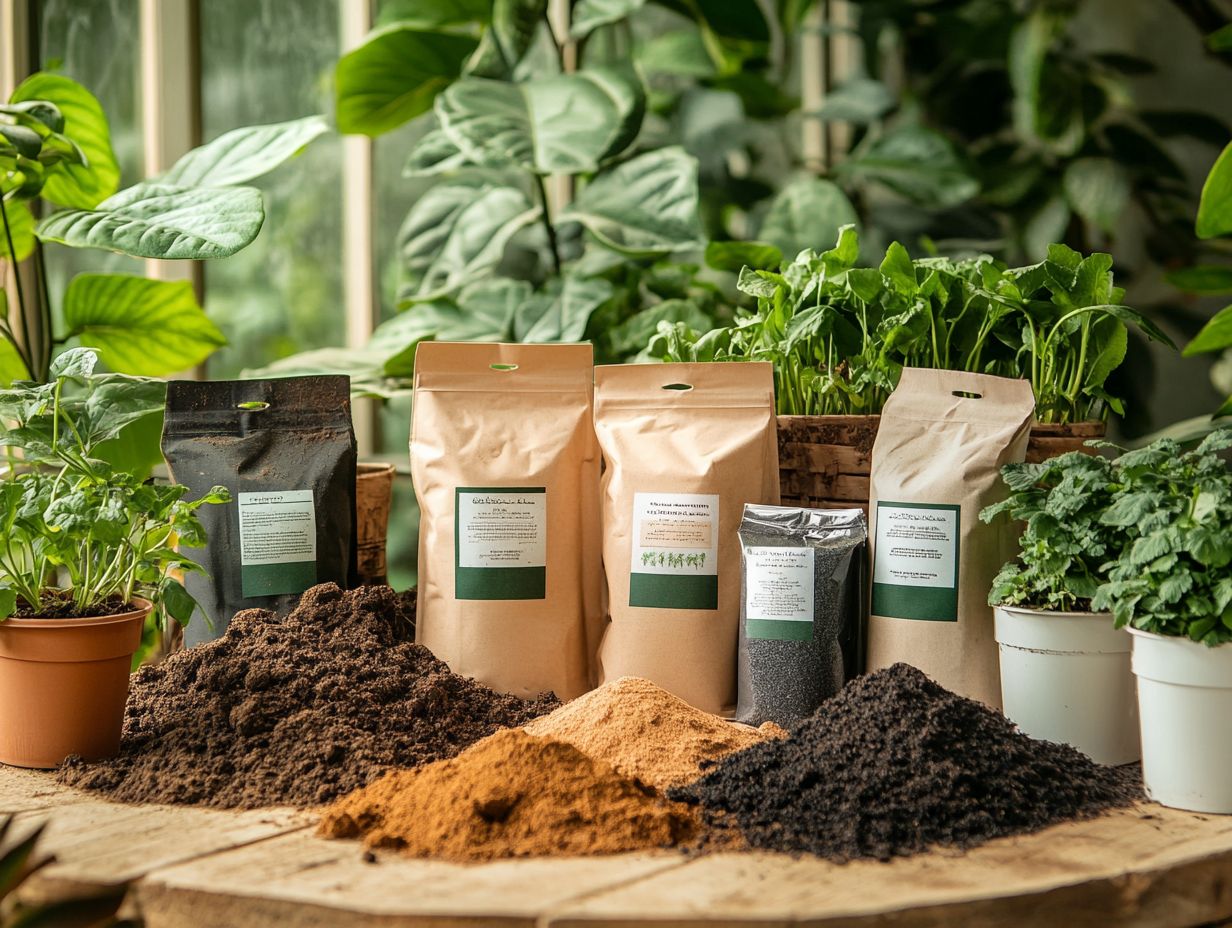
- Organic fertilizers, such as compost and natural fertilizers like manure, are sustainable alternatives to synthetic options.
- These fertilizers provide essential nutrients for plants and improve soil health, resulting in healthier and more productive plants.
- To make your own organic fertilizer at home, consider using materials like compost, manure, and seaweed, and follow best practices to ensure effectiveness.
1. Compost
Compost is essential to your sustainable gardening journey. It provides an eco-friendly way to enrich soil health and structure. Plus, it nurtures helpful tiny creatures vital for thriving plants.
By recycling organic materials like kitchen scraps, garden waste, and well-rotted manure, you enhance nutrient availability and improve soil texture. This creates a vibrant garden ecosystem that supports robust plant growth.
This versatile material has different forms, such as green compost, brown compost, and worm castings, each playing a unique role in the soil dynamic. You can utilize a wide range of compostable materials including fruit and vegetable peels, coffee grounds, grass clippings, and shredded leaves to foster a rich blend of nutrients.
Through composting, you significantly boost soil health by promoting aeration and moisture retention, ultimately enhancing your garden’s vitality.
Start using organic gardening techniques today! You ll achieve better nutrient management, reduce reliance on chemical fertilizers, and cultivate a balanced, flourishing environment for your plants.
2. Manure
Manure, especially the well-rotted kind from herbivores, is a remarkably effective natural fertilizer. It enriches your soil with essential nutrients like nitrogen, phosphorus, and potassium, which are crucial for optimal plant growth.
Various types of manure, including poultry and cow manure, also offer trace elements that your plants can use effectively. When you apply manure, you enhance your soil structure, creating a vibrant habitat for beneficial microorganisms. These tiny allies break down organic matter and make nutrients more accessible to your plants.
For those passionate about organic gardening, embracing best practices such as:
- Composting manure before application
- Monitoring nutrient levels
- Utilizing it during the growing season
can help you maximize its benefits. This approach prevents nutrient runoff and ensures your gardening efforts remain sustainable and fruitful.
3. Bone Meal
Bone meal is made from animal bones. It’s rich in phosphorus and calcium, which help plants grow strong roots and produce beautiful flowers.
This organic amendment not only bolsters plant growth but also enhances overall soil fertility. It’s an essential addition for any gardener aiming to elevate their growing medium. When applied with care, bone meal provides a balanced nutrient supply, promoting healthy flowering and fruiting stages.
You can easily incorporate it into the soil or use it as a top dressing, especially at planting time or during early growth phases.
Just remember to keep an eye on pH levels; too much phosphorus can disrupt nutrient availability. Regular soil pH testing will ensure your garden remains productive and flourishing, yielding the vibrant results you desire.
Start your journey to a healthier garden today!
Want Your Plants to Thrive? Discover the Magic of Fish Emulsion!
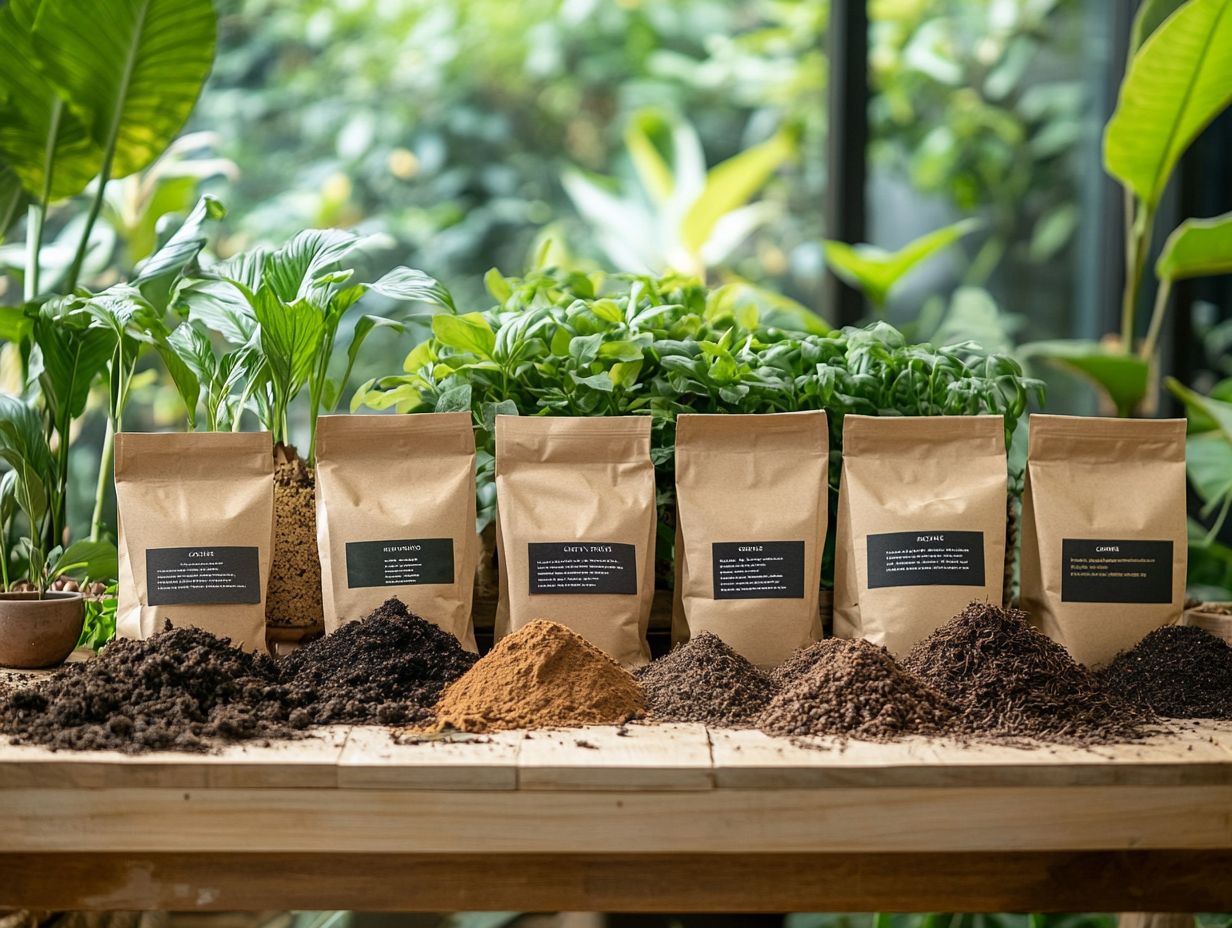
Fish emulsion is a remarkable, nutrient-dense organic fertilizer crafted from fish by-products. It offers your plants essential nutrients like nitrogen and trace minerals that enhance their growth and resilience.
Its rapid action makes it an excellent choice for those who wish to swiftly remedy nutrient deficiencies. Whether you apply it as a foliar spray or a soil drench, you’ll find that it encourages vigorous growth and enriches soil health over time.
By boosting microbial activity in the soil, fish emulsion cultivates a thriving ecosystem vital for your plants’ ongoing vitality. Regularly incorporating this organic fertilizer can lead to increased yields and sturdier plants, making it a beloved option for both novice and experienced gardeners.
Unlock the Benefits of Seaweed and Kelp!
Seaweed and kelp serve as exceptional organic fertilizers, brimming with natural nutrients that elevate soil health and support robust plant growth. These marine plants are truly invaluable for eco-friendly gardening.
Rich in essential minerals, trace elements, and growth hormones, they significantly enhance the vitality of the soil ecosystem. When you incorporate them into your garden beds, they improve soil structure, stimulate beneficial microbial activity, and enhance moisture retention.
Their natural compounds work wonders, promoting greater nutrient availability and allowing your plants to absorb vital elements like nitrogen, potassium, and phosphorus more effectively.
Incorporating seaweed and kelp leads to stronger root systems and healthier foliage, resulting in resilient plants that can better endure environmental stresses and fend off pests. By choosing these options, you can cultivate a flourishing outdoor environment while reducing dependence on synthetic fertilizers.
What Are Organic Fertilizers and How Do They Differ from Chemical Fertilizers?
Organic fertilizers, sourced from natural materials, enhance eco-friendly gardening by improving nutrient availability in your soil. In contrast, synthetic fertilizers, which often rely on chemical compounds, can adversely affect both the environment and soil health.
The key difference between the two lies in their composition and nutrient sources. Organic options think compost, manure, and bone meal release nutrients slowly, nurturing a healthier soil ecosystem.
Synthetic fertilizers may give your plants an immediate boost, but they can also lead to nutrient runoff, which is the loss of nutrients from the soil due to rain or irrigation, and degrade soil structure over time.
Choose organic fertilizers today and start enriching your soil s health immediately! You not only improve its structure, promote microbial activity, and maintain optimal moisture levels.
When weighing environmental impacts, opting for organic methods can significantly reduce pollution and support sustainable practices, ultimately cultivating a more resilient gardening environment.
How Do Organic Fertilizers Benefit Soil and Plants?
Organic fertilizers play a vital role in enhancing soil health by boosting nutrient availability, nurturing beneficial microorganisms, and enriching the soil with organic matter. For those interested in improving their gardens, exploring the top 5 soil amendments for healthy gardens can be essential for promoting vibrant plant growth.
This natural approach improves soil structure, facilitating better aeration and water retention. It also helps establish a balanced pH, which is crucial for optimal nutrient uptake.
The slow-release nutrients in organic fertilizers ensure effective nutrient management, allowing your plants to receive what they need at the right moment without the risk of over-fertilization.
As a result, plants treated with organic fertilizers often demonstrate increased vitality, resilience, and improved disease resistance. This contributes to a flourishing garden or agricultural landscape.
What Are the Best Practices for Using Organic Fertilizers?
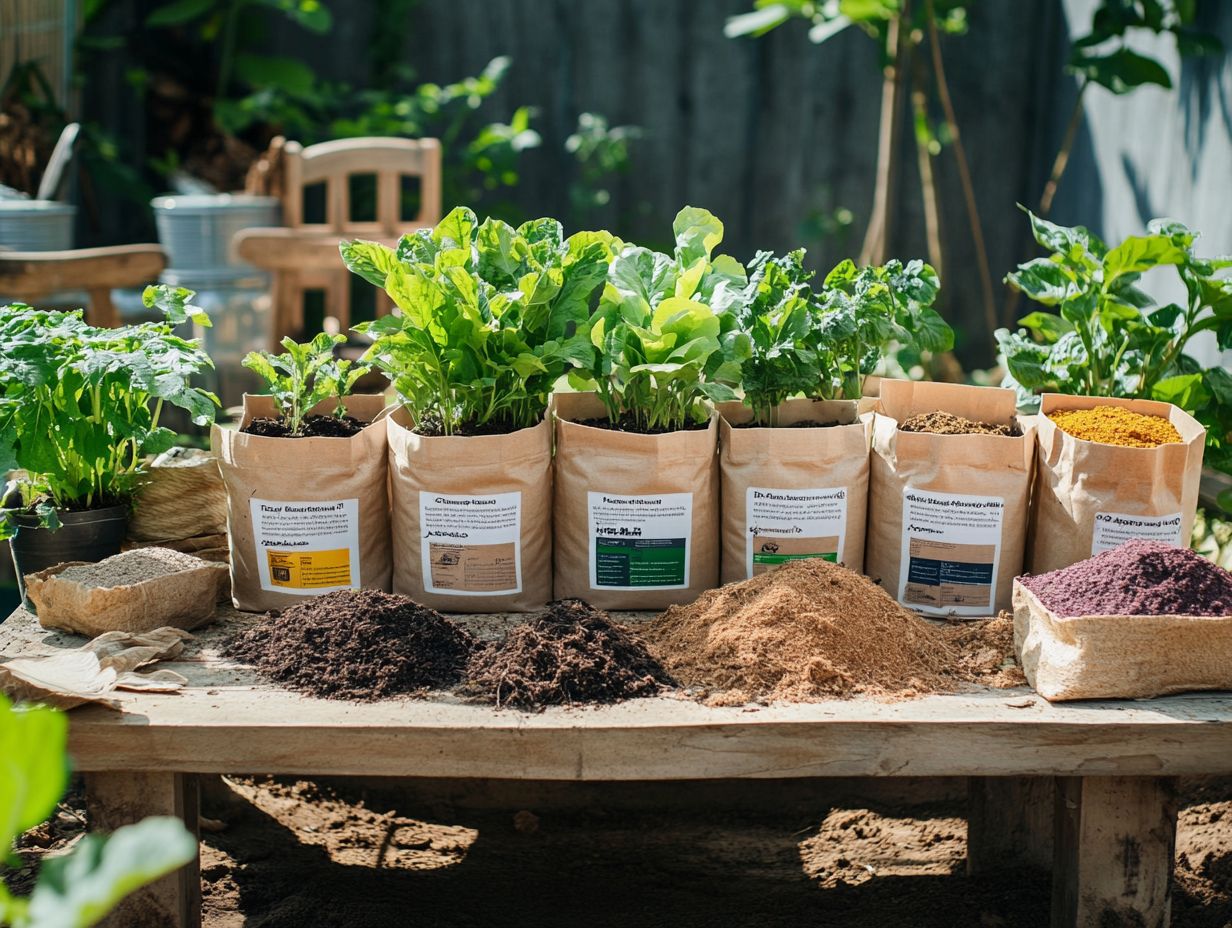
To truly harness the benefits of organic fertilizers, understand your soil conditions and adhere to best practices for application. This includes timing your applications wisely and exploring 5 ways to use worm castings for soil to ensure effective nutrient management.
Begin by assessing your soil texture. Sandy soil drains quickly, so it may require more frequent applications. In contrast, clay soils retain nutrients longer but can become compacted. Knowing how well your soil holds nutrients will help you determine the right amount of fertilizer to use.
Timing is crucial. Apply organic fertilizers during the growing season, preferably just before rain or irrigation, to enhance nutrient uptake. Using compost or well-rotted manure provides a slow release of nutrients over time, promoting sustained growth.
Consider rotating your crops to optimize nutrient use and minimize depletion. This creates a more vibrant and productive garden ecosystem.
What Are the Pros and Cons of Using Organic Fertilizers?
Organic fertilizers offer numerous benefits, such as enhancing soil health and promoting sustainability. However, they also have drawbacks, like slower nutrient release and potential nutrient deficiencies if not managed properly.
Using these natural amendments boosts microbial activity, enriching soil structure and fostering biodiversity. However, their slow-release nature can complicate immediate nutrient needs for plants, especially during crucial growth phases. Careful management is essential to maintain balanced nutrient levels, as excess of one type can lead to deficiencies in others.
In summary, while organic fertilizers play a vital role in long-term ecological viability, understanding their complex dynamics is crucial for maximizing benefits and addressing challenges in agricultural practices.
How Can One Make Their Own Organic Fertilizer at Home?
Making your own organic fertilizer is not only fun, but it s also a great way to boost your garden! It allows you to recycle kitchen scraps and enrich your garden with nutrient-dense organic materials, supporting sustainable gardening practices.
By transforming everyday waste into valuable compost, you help reduce landfill waste while enhancing soil health. Start your composting journey by gathering a delightful mix of:
- Green materials: Vegetable peels, coffee grounds
- Brown materials: Dry leaves, cardboard
Layer these ingredients in a compost bin or pile, ensuring proper aeration by regularly turning the mixture. Maintain a balanced ratio typically one part greens to three parts browns to foster healthy decomposition and prevent unpleasant odors. With a bit of patience and care, you ll soon reap the rewards: a rich, nourishing fertilizer for your garden.
What Are Some Common Myths About Organic Fertilizers?
Many misconceptions about organic fertilizers persist, such as the belief that they re less effective than synthetic options or that they don t suit all gardening needs. These myths can hinder your sustainable gardening efforts.
Understanding the reality of these natural alternatives reveals their impressive ability to nourish plants over time. Unlike synthetic fertilizers, organic options release nutrients gradually, fostering healthier soil and encouraging beneficial microbial activity. For those looking to boost their gardening efforts, exploring 5 ways to improve soil organic content can significantly enhance plant growth.
These fertilizers are incredibly versatile and can integrate seamlessly into various gardening methods, whether you re tending to a vegetable patch, a flower bed, or container gardening. By recognizing diverse nutrient sources like compost, manures, and bone meal you can select the right option for your needs. This approach leads to thriving landscapes and a more sustainable way to garden.
Frequently Asked Questions
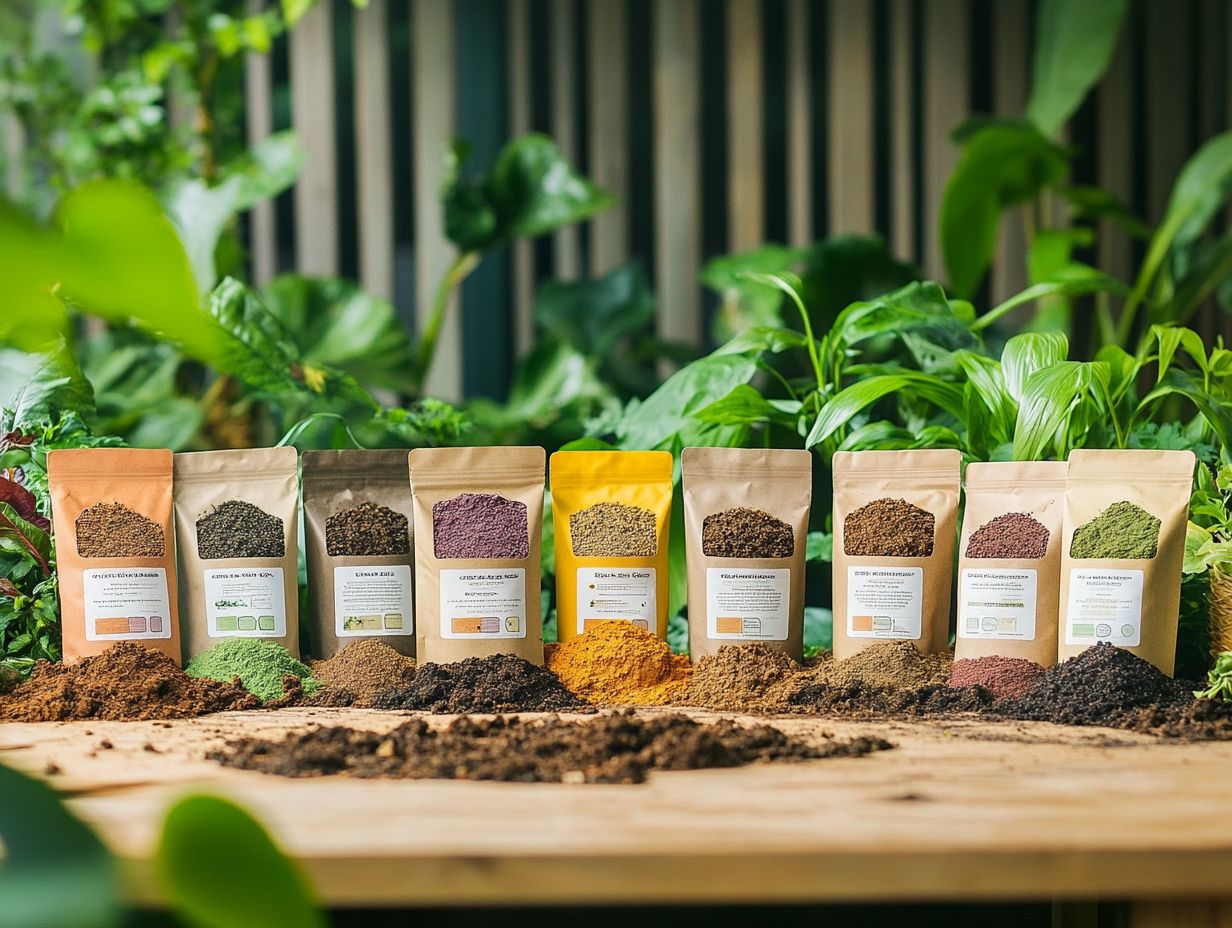
What are the 5 essential organic fertilizers for soil?
The 5 essential organic fertilizers are:
- Compost
- Manure
- Bone Meal (made from crushed animal bones)
- Blood Meal (created from dried animal blood, rich in nitrogen)
- Fish Emulsion
These fertilizers provide necessary nutrients for thriving plants and improve soil health.
Why should I use organic fertilizers for my soil?
Organic fertilizers are better for the environment. They promote long-term soil health and prevent chemical build-up in the soil.
Can I make my own organic fertilizer at home?
Absolutely! You can create your own organic fertilizer using kitchen scraps, grass clippings, and other organic materials. It’s cost-effective and ensures the use of natural ingredients in your soil.
How often should I apply organic fertilizers to my soil?
The frequency of application depends on your plants’ needs and your soil’s condition. Generally, it is recommended to apply every 4-6 weeks during the growing season.
Are there any disadvantages to using organic fertilizers for soil?
One disadvantage is that organic fertilizers can take longer to release nutrients compared to synthetic options. They also tend to have lower nutrient concentrations, requiring larger quantities to be applied.
Can I use organic fertilizers for all types of plants?
Yes, organic fertilizers can be used for all types of plants, including flowers, vegetables, and fruits. They provide a balanced and natural source of nutrients without harming beneficial soil organisms.



